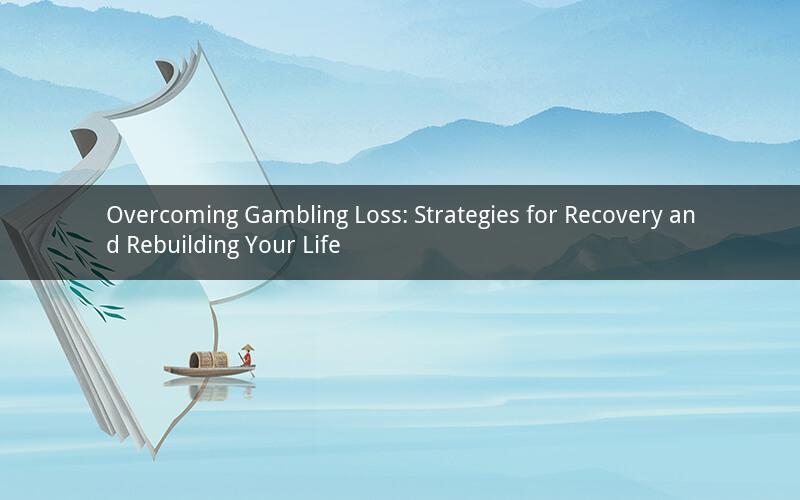
Introduction:
Gambling addiction can lead to significant financial and emotional consequences. The journey to recovery from gambling loss is challenging but not impossible. This article explores various strategies and resources available to help individuals recover from gambling loss and rebuild their lives.
1. Understanding the Impact of Gambling Loss
Gambling addiction not only causes financial hardship but also affects personal relationships, mental health, and overall well-being. Recognizing the consequences of gambling loss is the first step towards recovery. It is essential to acknowledge the impact it has had on your life and the lives of those around you.
2. Accepting Responsibility
Accepting responsibility for your gambling addiction is crucial in the recovery process. This involves acknowledging that you have a problem and are willing to make changes. Accepting responsibility helps you take control of your situation and seek help.
3. Seeking Professional Help
Professional help is essential in overcoming gambling loss. A therapist or counselor can provide guidance, support, and personalized strategies tailored to your specific needs. Therapy may include cognitive-behavioral therapy (CBT), which focuses on identifying and changing negative thought patterns associated with gambling.
4. Developing Coping Mechanisms
Gambling can become a coping mechanism for dealing with stress, anxiety, or boredom. Finding healthier ways to cope is crucial in preventing relapse. Engaging in activities such as exercise, hobbies, or joining support groups can provide alternative ways to manage emotions and reduce the urge to gamble.
5. Establishing a Support System
A strong support system is vital in the recovery process. Reach out to friends, family, or support groups for encouragement and guidance. Surrounding yourself with positive influences can help you stay on track and provide emotional support during challenging times.
6. Creating a Budget and Financial Plan
Addressing the financial consequences of gambling loss is a critical aspect of recovery. Create a budget to manage your expenses and prioritize necessary bills. Consider seeking assistance from credit counseling services to develop a financial plan and address any outstanding debts.
7. Staying Away from Triggers
Identifying and avoiding triggers is essential in preventing relapse. Triggers can be anything that reminds you of gambling, such as casinos, slot machines, or certain places where you used to gamble. By staying away from these triggers, you can reduce the urge to gamble.
8. Setting Goals and Celebrating Progress
Set realistic goals for your recovery journey and celebrate each milestone achieved. Setting goals helps you stay motivated and focused on your progress. Celebrating small victories can provide a sense of accomplishment and reinforce positive behavior.
9. Continuing Education and Self-Reflection
Education about gambling addiction and its consequences can be beneficial in maintaining long-term recovery. Attend workshops, read books, or seek out online resources to gain a deeper understanding of your addiction. Self-reflection allows you to identify patterns and triggers, helping you stay vigilant and proactive in your recovery.
10. Patience and Persistence
Recovery from gambling loss is a gradual process that requires patience and persistence. Understand that setbacks are a part of the journey, and it is essential to stay committed to your recovery plan. Seek support from others who have experienced similar challenges and maintain a positive mindset.
Frequently Asked Questions:
1. Q: How long does it take to recover from gambling loss?
A: The duration of recovery varies from person to person. It can take weeks, months, or even years to fully recover from gambling loss. The key is to remain committed to the recovery process and seek support along the way.
2. Q: Can I recover from gambling loss on my own?
A: While some individuals may find success in recovering from gambling loss independently, seeking professional help and joining support groups can significantly enhance the recovery process. Professional guidance and support from others who have experienced similar challenges can provide valuable tools and encouragement.
3. Q: Will I always be at risk of relapse?
A: Relapse is a possibility in the recovery process, but it does not mean you have failed. Relapse is a learning opportunity to identify triggers and develop stronger coping mechanisms. With continued effort and support, you can minimize the risk of relapse.
4. Q: Can I continue gambling after recovery?
A: After recovering from gambling loss, it is generally recommended to avoid gambling altogether. This is because gambling can trigger cravings and potentially lead to relapse. However, if you choose to gamble, it is crucial to do so responsibly and within your means.
5. Q: How can I support a loved one who is struggling with gambling loss?
A: Support from loved ones can be incredibly beneficial in the recovery process. Offer your empathy, patience, and understanding. Encourage your loved one to seek professional help and join support groups. Be a reliable source of emotional support and remind them that they are not alone in their journey.